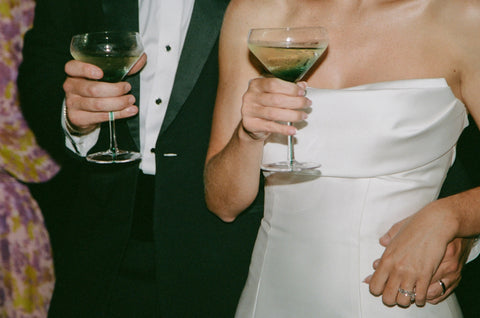A colorful suit or tuxedo replaces classic black or navy with vivid hues—think emerald, burgundy, or even mustard—to make a statement while preserving formal lines. But knowing when to make the switch can feel like a guessing game if you haven't tried it before. In this guide, we’ll show you when and how to wear colorful suits and tuxedos, pair them with the right accessories, and choose fabrics that flatter every season.
Shop Colorful Suits →
What Is a Colorful Suit?
Traditionally, formal menswear revolved around black, midnight blue, and charcoal colors. Advances in dye technology and shifting dress codes opened the door to saturated shades. A colorful suit spans a spectrum—from the refined depth of a forest-green tuxedo to the eye-catching pop of pastel linen—while its formality depends on fabric, fit, and occasion.
When to Wear a Colorful Suit
Weddings
- Groom or groomsmen: Jewel-tone tux colors (emerald, burgundy) photograph beautifully and differentiate the wedding party without clashing with décor.

Emerald Shawl Tuxedo by The Black Tux
- Guests: A muted teal or dusty-rose suit looks festive yet respectful—avoid overshadowing the couple.

Rose Shawl Jacket Tuxedo by The Black Tux
Prom & Galas
Creative black-tie events invite bolder experimentation. Swap a black jacket for a deep-plum shawl-lapel tux; keep the shirt crisp white for contrast.

Plum Shawl Tuxedo by The Black Tux
Business-Creative Events
In fashion, media, and tech, a colorful suit signals confidence. Pair a bronzed-brown suit with a tonal knit polo for a conference keynote, then switch to a dress shirt and tie for evening networking.

Brown Suit by The Black Tux
Holiday Parties & NYE
Velvet jewel tones shine in evening light and pair naturally with festive metallic accessories.
Ocean Velvet Jacket Tuxedo by The Black Tux
Styling Tips & Color Pairing
Color Wheel Basics
Complementary colors (opposites on the wheel) create high contrast, while analogous colors (neighbors) feel harmonious. Use one dominant hue (the suit) and one accent (tie or pocket square); keep everything else neutral. For example, a teal suit with a sky-blue pocket square stays cohesive without looking monotone.
Safe Starter Combos
- Burgundy suit + black accessories
- Midnight-blue tux + silver tie bar & cufflinks
- Olive suit + ivory shirt + dark-brown shoes
High-Contrast Looks
- Emerald tux + gold accents (cufflinks, button studs, etc.)
- Rust-orange suit + navy knit tie
- Pastel-lilac linen suit + charcoal shirt
Color Pairing Basics
| Suit Hue | Tie / Bow | Pocket Square | Shoes | Metal Accents |
|---|---|---|---|---|
| Burgundy | Black satin bow tie | White linen | Black patent | Oxidized silver |
| Emerald | Gold satin bow tie | Emerald silk | Black patent | Brushed gold |
| Midnight Blue | Silver grenadine tie | Graphite satin | Black calf | Polished silver |
| Teal | Navy knit tie | Mustard linen | Dark-brown calf | Gunmetal |
| Rust | Burgundy wool tie | Navy silk | Dark-brown suede | Bronze |
| Mustard | Emerald knit tie | Burgundy velvet | Tan calf | Antique brass |
Accessories
Accessories are the punctuation marks of formalwear: they signal formality, pull colors together, and let you flex personality without rewriting the whole outfit.
Shoes
- Patent leather for tuxedos (black or oxblood).
- Calf or suede for suits; match belt tone to shoes.
Ties & Bow Ties
Satin bow ties elevate tuxedos; grenadine ties downplay bright suits for daytime. Metallic accents (tie bars, studs) should echo watch or cufflink metal.
Pocket Squares
Contrast fabric texture with the jacket: linen with velvet; silk with matte wool.
Socks
Match pants color or pick an accent shade pulled from the chart above; keep patterns subtle.
Watch Bands & Rings
Keep metal finishes consistent—pair brushed gold cufflinks with a matching watch bezel; avoid clashing silver and bronze tones in the same look.
Consider the Season
Color and cloth behave differently as temperatures shift; the right fabric weight and shade keep you comfortable while matching the season’s mood.
| Season | Fabric | Best Tux Colors | Best Suit Colors |
|---|---|---|---|
| Spring | Linen-blend, tropical wool | Soft mint; pastel-blue velvet dinner jacket | Dusty rose; sage |
| Summer | Lightweight wool; cotton seersucker | Ice-blue shawl lapel | Sun-washed coral; pale grey |
| Fall | Worsted wool; tweed accents | Burgundy peak lapel | Copper; forest green |
| Winter | Velvet; wool-mohair | Deep emerald velvet | Midnight-blue flannel |
FAQs
Can I wear a colorful tux to a black-tie wedding?
Yes—if the invitation says “creative black tie.” Choose a deep, saturated hue like burgundy or emerald and keep accessories classic (patent shoes, French-cuff shirt).
What shirt color goes with a green tuxedo?
A crisp white or pale-blue French-front shirt balances emerald or forest-green tones without competing for attention.
Are colorful suits appropriate for the office?
In creative or relaxed business environments, yes. Opt for muted shades (olive, slate blue) and tone down accessories.
Which season is best for a velvet tux?
Fall and winter. Velvet’s rich pile and weight suit cooler temperatures and holiday formality.
What color tux photographs best at night?
Deeper jewel tones—emerald, burgundy, midnight blue—absorb flash glare better than pure black while still reading formal. Their subtle saturation helps you stand out against dark backdrops without blowing out highlights.
The Final Word
Whether you’re stepping into a pastel suit for a spring wedding or donning an emerald velvet tux for a winter gala, mastering color unlocks memorable style.








